Thinking from Various Perspectives including Value, Vision, Methodology, Originality, Worth, Leaps and Timescales, What Differentiates the Humanities and the Sciences?
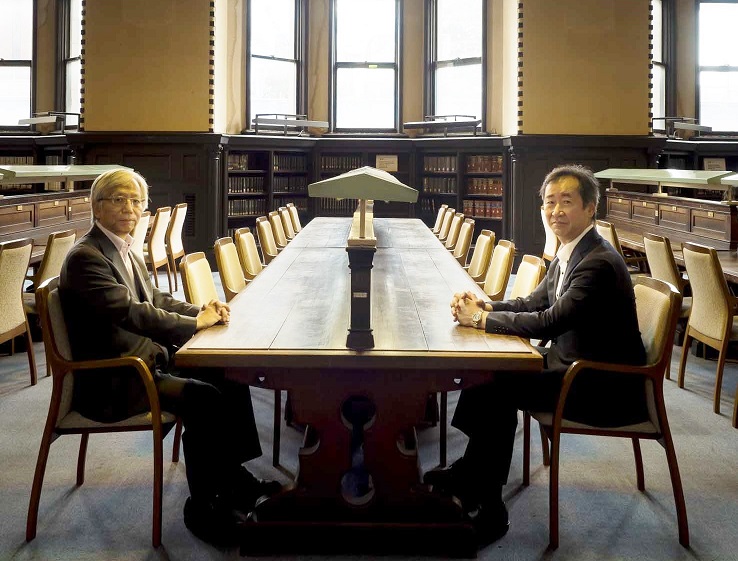
Serving as an executive vice president, Professor Ishii has played an active role in the management of the University while pursuing his research on a poet known for his rebellious and blasphemous works, Comte de Lautréamont. Professor Kajita, meanwhile, has headed the Institute for Cosmic Ray Research as its director while continuing with his research on the ghost-like particles known as neutrinos. Professor Ishii and Professor Kajita, who represent the University in the fields of the humanities and the sciences, respectively, enjoy a lively exchange of opinions on the characteristics of each other's fields from their own perspectives. Between French literature and particle physics, there seem to exist similarities that go beyond disciplinary boundaries.
Shirahase: First, let us hear about your image of or ideas on each other’s field; that is, Science from the Humanities point of view and Humanities from the Science point of view.
Kajita: This is just my impression, but it seems to me that researchers in the sciences determinedly focus on one direction without seeing any other directions, whereas those in the humanities have a wider, more comprehensive view of everything.
Ishii: I do not think that it makes much sense to group academic disciplines into either the humanities or the sciences.*1 That aside, it seems to me that in the sciences, there are truths somewhere to be sought out. Meanwhile, in the humanities, no strict rules exist in this aspect; people in the humanities are apparently allowed to say anything. I think that those studying the latter probably view the concept of the truth differently from those studying the former. For instance, Professor Kajita, it used to be believed as truth that neutrinos have no mass, right?
Kajita: "It used to be believed as truth" is a bit of an exaggeration. The reality was more like, "Let's assume that this is probably the truth and go from there."
Shirahase: First, let us hear about your image of or ideas on each other’s field; that is, Science from the Humanities point of view and Humanities from the Science point of view.
Kajita: This is just my impression, but it seems to me that researchers in the sciences determinedly focus on one direction without seeing any other directions, whereas those in the humanities have a wider, more comprehensive view of everything.
Ishii: I do not think that it makes much sense to group academic disciplines into either the humanities or the sciences.*1 That aside, it seems to me that in the sciences, there are truths somewhere to be sought out. Meanwhile, in the humanities, no strict rules exist in this aspect; people in the humanities are apparently allowed to say anything. I think that those studying the latter probably view the concept of the truth differently from those studying the former. For instance, Professor Kajita, it used to be believed as truth that neutrinos have no mass, right?
Kajita: "It used to be believed as truth" is a bit of an exaggeration. The reality was more like, "Let's assume that this is probably the truth and go from there."
Can truths in the sciences be overwritten?
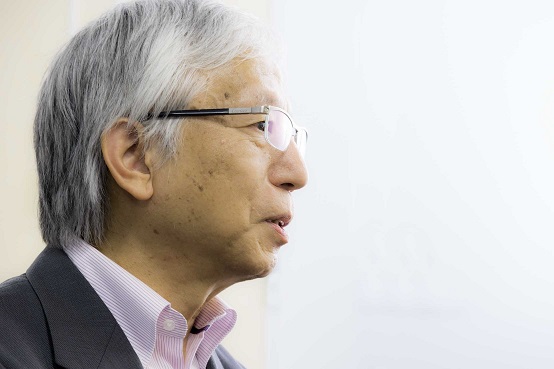
Executive Vice President, The University of Tokyo
Ishii: I see. But with your discovery, you turned that assumption on its head. I think that in scientific fields, progress has been made by overwriting existing assumptions. On the other hand, in the humanities, it seems that the opinions of this person and that person are merely being accumulated. Unlike in the sciences, where the geocentric model was replaced with heliocentrism, for example, the dramatic overwriting of what is believed to be the truth seldom takes place in the humanities.
Kajita: Actually, our studies are also the accumulation of previous achievements. My impression is that what takes place in our field is not overwriting existing beliefs but taking the insufficient parts of existing beliefs and gradually developing them into deeper and more complete beliefs.
Shirahase: It appears that in the sciences, research is conducted step by step within the specialized framework of each field, and new findings are allocated after evaluating previous studies. On the other hand, in the humanities, the ways to evaluate existing views do not necessarily follow strict rules; there is relative leeway to go against existing rules. I wonder if you agree or not.
Ishii: I agree with you. For example, in the courses of the sciences offered by the University, students are required to take subjects in a certain order. In the humanities, meanwhile, perhaps it wouldn’t be a problem if students took courses at random.
Shirahase: So, perhaps it could be said that it is more difficult to do something original in the sciences.
Kajita: Particularly in my case, showing originality is rather difficult because I am a researcher who mainly conducts experiments and observations. However, even within the same field of physics, professors specializing in theoretical physics sometimes can discover a new direction by providing a viewpoint that nobody has ever thought of before. Experimental physics, meanwhile, consists of continuing to conduct observations step by step and reporting precise results.
Ishii: One can say that it is easier for people in the humanities to show originality because anything goes in their field. By the same token, it also can be said that this aspect cheapens the value of originality. Originality becomes valuable only when there are academic systems that are believed to be true. If disciplines are considered to be too free to deny anything, the public may say that those disciplines cannot meet societal demand because everything is subject to an individual's manner of perspective, and that therefore such disciplines do not have to be taught at national universities.
Shirahase: For example, Professor Kajita, your research does not appear to be in response to any particular request from society. You aren’t conducting your research because you have been asked to do so, correct?
Kajita: Definitely not! (laughs) Society likely demands many things from researchers in the sciences, including requests for improving our daily life, but my research cannot answer these kinds of requests. Even when I found out that neutrinos have mass, that fact has had no influence on our daily lives at all.
Shirahase: Wow, that was a definitive answer! (laughs)
Kajita: Of course, neutrinos may become useful in our daily lives in 1,000 years. But when society asks for something, it does not expect that such a request would be completed in a time span of 1,000 years, right? In this sense, my research cannot meet societal demands. I am motivated to conduct my research not by a desire to meet societal demands but by an aspiration to "broaden the horizons of knowledge."
Shirahase: Hearing what you said now, I felt that the substantial differences between the humanities and the sciences aren’t so great after all. (laughs) Having said that, we need financial backup to proceed with our research. In order to obtain it, perhaps what is necessary is making people whose specialties are different or who are not from academic backgrounds understand our research. What do you think?
Ishii: Well, of course, there are useful disciplines in the humanities, and there are disciplines that are not readily useful in the sciences. In this sense, the humanities and the sciences are not diametrically opposed to one another. In reality, however, people tend to make the simplistic generalization that the humanities as a whole do not meet societal demands.
Kajita: Actually, our studies are also the accumulation of previous achievements. My impression is that what takes place in our field is not overwriting existing beliefs but taking the insufficient parts of existing beliefs and gradually developing them into deeper and more complete beliefs.
Shirahase: It appears that in the sciences, research is conducted step by step within the specialized framework of each field, and new findings are allocated after evaluating previous studies. On the other hand, in the humanities, the ways to evaluate existing views do not necessarily follow strict rules; there is relative leeway to go against existing rules. I wonder if you agree or not.
Ishii: I agree with you. For example, in the courses of the sciences offered by the University, students are required to take subjects in a certain order. In the humanities, meanwhile, perhaps it wouldn’t be a problem if students took courses at random.
Shirahase: So, perhaps it could be said that it is more difficult to do something original in the sciences.
Kajita: Particularly in my case, showing originality is rather difficult because I am a researcher who mainly conducts experiments and observations. However, even within the same field of physics, professors specializing in theoretical physics sometimes can discover a new direction by providing a viewpoint that nobody has ever thought of before. Experimental physics, meanwhile, consists of continuing to conduct observations step by step and reporting precise results.
Ishii: One can say that it is easier for people in the humanities to show originality because anything goes in their field. By the same token, it also can be said that this aspect cheapens the value of originality. Originality becomes valuable only when there are academic systems that are believed to be true. If disciplines are considered to be too free to deny anything, the public may say that those disciplines cannot meet societal demand because everything is subject to an individual's manner of perspective, and that therefore such disciplines do not have to be taught at national universities.
Shirahase: For example, Professor Kajita, your research does not appear to be in response to any particular request from society. You aren’t conducting your research because you have been asked to do so, correct?
Kajita: Definitely not! (laughs) Society likely demands many things from researchers in the sciences, including requests for improving our daily life, but my research cannot answer these kinds of requests. Even when I found out that neutrinos have mass, that fact has had no influence on our daily lives at all.
Shirahase: Wow, that was a definitive answer! (laughs)
Kajita: Of course, neutrinos may become useful in our daily lives in 1,000 years. But when society asks for something, it does not expect that such a request would be completed in a time span of 1,000 years, right? In this sense, my research cannot meet societal demands. I am motivated to conduct my research not by a desire to meet societal demands but by an aspiration to "broaden the horizons of knowledge."
Shirahase: Hearing what you said now, I felt that the substantial differences between the humanities and the sciences aren’t so great after all. (laughs) Having said that, we need financial backup to proceed with our research. In order to obtain it, perhaps what is necessary is making people whose specialties are different or who are not from academic backgrounds understand our research. What do you think?
Ishii: Well, of course, there are useful disciplines in the humanities, and there are disciplines that are not readily useful in the sciences. In this sense, the humanities and the sciences are not diametrically opposed to one another. In reality, however, people tend to make the simplistic generalization that the humanities as a whole do not meet societal demands.
“I don’t want to think of research from a standpoint of ‘utility’”
Ishii: I think that some are of the opinion that people in the humanities should emphasize the usefulness of their disciplines*2. However, I don't want to think of research from a standpoint of "utility." I believe that there is another reason for the existence of the humanities. Humans are irrational beings; they sometimes do foolish things that they know will make them unhappy. They know that doing these things is wrong, but they cannot help it. That is just the way humans are. I think that the meaning of the humanities lies in interpreting this irrational human nature. The humanities may not be practical, but they are an indispensable pursuit for human beings.
"Broadening the horizons of knowledge," to borrow Professor Kajita’s words, is also a type of human pursuit. Why do human beings exist in this universe? The desire to know the answer to this question is an integral part of human nature. I think that in this sense, Professor Kajita's research can be very much considered a part of the humanities.
Kajita: It makes me happy to hear you say that.
Shirahase: I feel that "broadening the horizons of knowledge" sounds adventurous and romantic! That being said, perhaps it may so abstract that people may find it difficult to sympathize with the idea.
Kajita: In the sciences, receiving grants is a prerequisite for conducting research. The larger a project, the more the project needs support from the public. If your research is about something that is generally considered not to be useful, however, simply insisting to the public that it is useful will not convince them. So, I try to be straightforward and honest with the public about my research. I say things like, "Although I do not think that everyone is interested in the mysteries of the universe, trying to unveil these mysteries will be useful for humanity in general."
Ishii: In scholarship, there must exist both research that drives the economy and research that can be critical of this economic-driven research. I think that universities cannot fully function until they have cultivated both types of research. The mission of the University is to develop disciplines in all fields in a balanced way.
Kajita: I agree. In 2016, the U.K. decided to exit from the EU, and terrorism attacks frequently took place around the world. I feel that humanity is going through a major turning point. When discussing what the world should do under these circumstances, people must utilize disciplines in which new solutions can be developed by studying past human activities. And those disciplines cannot be anything other than those in the humanities, so I’m a little envious.
"Broadening the horizons of knowledge," to borrow Professor Kajita’s words, is also a type of human pursuit. Why do human beings exist in this universe? The desire to know the answer to this question is an integral part of human nature. I think that in this sense, Professor Kajita's research can be very much considered a part of the humanities.
Kajita: It makes me happy to hear you say that.
Shirahase: I feel that "broadening the horizons of knowledge" sounds adventurous and romantic! That being said, perhaps it may so abstract that people may find it difficult to sympathize with the idea.
Kajita: In the sciences, receiving grants is a prerequisite for conducting research. The larger a project, the more the project needs support from the public. If your research is about something that is generally considered not to be useful, however, simply insisting to the public that it is useful will not convince them. So, I try to be straightforward and honest with the public about my research. I say things like, "Although I do not think that everyone is interested in the mysteries of the universe, trying to unveil these mysteries will be useful for humanity in general."
Ishii: In scholarship, there must exist both research that drives the economy and research that can be critical of this economic-driven research. I think that universities cannot fully function until they have cultivated both types of research. The mission of the University is to develop disciplines in all fields in a balanced way.
Kajita: I agree. In 2016, the U.K. decided to exit from the EU, and terrorism attacks frequently took place around the world. I feel that humanity is going through a major turning point. When discussing what the world should do under these circumstances, people must utilize disciplines in which new solutions can be developed by studying past human activities. And those disciplines cannot be anything other than those in the humanities, so I’m a little envious.
“Leaping” is the defining characteristic of the humanities
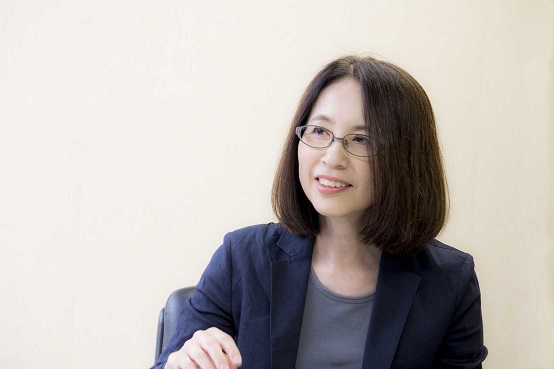
Vice Director of the Public Relations Office, The University of Tokyo
Shirahase: You were talking about research that offers constructive criticism of other disciplines. In the humanities, procedures for criticism seem to be liberal in a sense. What is the situation like in the sciences, Professor Kajita?
Kajita: When reading books written by humanities professors, I feel that the procedures for criticism in their field are somewhat different from ours. In the sciences, you have to demonstrate evidence when proposing a new idea. Seeing how criticism is conducted in the humanities, however, I sometimes wonder if the criticism is based on sufficient evidence. In the sciences, without considerable evidence, offering criticism is absolutely impossible.
Shirahase: It’s the same in the humanities. If you want to present a new idea, you will not be able to convince people of its legitimacy without evidence in the end. That being said, I don’t think it would be exciting for a researcher only to be searching for evidence.
Ishii: I think that the very thing that makes the humanities what they are is that, after collecting and considering pieces of evidence, researchers take a leap at the final moment when they try to form a conclusion. Once reaching the threshold, they daringly jump even if they do not have evidence, taking care that the way they jump looks as impressive as possible. For researchers in the sciences, meanwhile, it is important to accumulate evidence, and this evidence should be obtained through strict procedures so that the truth can be approached gradually. However, if researchers in the humanities constantly used this type of approach, their research would end up producing mediocre results. Without leaps, their research would become dull.
Kajita: In my opinion, the sciences also develop through researchers taking a leap at some point during the scientific process. For example, in the field of particle theory, ideas which had heretofore been undiscovered can be added to the existing framework. This basically means newly incorporating important elements into the framework, but they must be elements that nobody has ever noticed before. That point is crucial.
Shirahase: What are your opinions on the concept of integrating the humanities and the sciences, a topic which has frequently been discussed as of late?
Ishii: Integration would not be an easy task. Trying to integrate the humanities and the sciences, two areas with completely different characteristics, is senseless. I think that collaboration and cooperation between the two would be more feasible. If integrated, the humanities and the sciences must be transformed into something totally new, which I think would be unachievable. That being said, perhaps different disciplines within the humanities or the sciences can be transformed into something new if integrated with each other.
Kajita: I think that just repeating the phrase "integration of the humanities and the sciences" like a mantra would give rise to nothing. Working at a research university is meaningful in that a researcher in the sciences like me can hear opinions from researchers in the humanities if the opportunity arises. Something I hear from them might be useful for something I do probably once in my lifetime. That’s the way I see it.
Shirahase: I think that it is quite important in doing interdisciplinary research that each member who participates in a project obtains basic academic training in the methodology of his/her own field.
Ishii: The concept of "internationality" is possible because there are nations. Similarly, the concept of "interdisciplinarity" is possible because there are disciplines. Therefore, obsessing over the integration of the humanities and the sciences proves meaningless when there is no common foundation. You have to have disciplines in order for interdisciplinarity to be valid concept.
Kajita: However, you should not stay solely within the bubble of your discipline.
Shirahase: So, what do you think about the humanities and sciences so far after this discussion we’ve been having?
Kajita: My impression is that the timescale for changes in global trends (including governmental) is probably not aligned with the timescale for scholarship, and that gap is likely important. In other words, universities and scholarship do not try to match their timescales with the general timescale followed by the rest of the world, and I believe that that is important. I reaffirmed my understanding that disciplines following their own timescales in this manner exist both in the sciences and the humanities.
Ishii: I agree with you. As an executive vice president, I am involved in drafting and evaluating the University’s six-year Mid-term Plan. However, I sometimes feel that discussing important matters like these within the short time span of six years may be a fruitless endeavor. I think that we have to have at least the next several decades, if not 1,000 years, in mind when cultivating scholarship.
Kajita: When reading books written by humanities professors, I feel that the procedures for criticism in their field are somewhat different from ours. In the sciences, you have to demonstrate evidence when proposing a new idea. Seeing how criticism is conducted in the humanities, however, I sometimes wonder if the criticism is based on sufficient evidence. In the sciences, without considerable evidence, offering criticism is absolutely impossible.
Shirahase: It’s the same in the humanities. If you want to present a new idea, you will not be able to convince people of its legitimacy without evidence in the end. That being said, I don’t think it would be exciting for a researcher only to be searching for evidence.
Ishii: I think that the very thing that makes the humanities what they are is that, after collecting and considering pieces of evidence, researchers take a leap at the final moment when they try to form a conclusion. Once reaching the threshold, they daringly jump even if they do not have evidence, taking care that the way they jump looks as impressive as possible. For researchers in the sciences, meanwhile, it is important to accumulate evidence, and this evidence should be obtained through strict procedures so that the truth can be approached gradually. However, if researchers in the humanities constantly used this type of approach, their research would end up producing mediocre results. Without leaps, their research would become dull.
Kajita: In my opinion, the sciences also develop through researchers taking a leap at some point during the scientific process. For example, in the field of particle theory, ideas which had heretofore been undiscovered can be added to the existing framework. This basically means newly incorporating important elements into the framework, but they must be elements that nobody has ever noticed before. That point is crucial.
Shirahase: What are your opinions on the concept of integrating the humanities and the sciences, a topic which has frequently been discussed as of late?
Ishii: Integration would not be an easy task. Trying to integrate the humanities and the sciences, two areas with completely different characteristics, is senseless. I think that collaboration and cooperation between the two would be more feasible. If integrated, the humanities and the sciences must be transformed into something totally new, which I think would be unachievable. That being said, perhaps different disciplines within the humanities or the sciences can be transformed into something new if integrated with each other.
Kajita: I think that just repeating the phrase "integration of the humanities and the sciences" like a mantra would give rise to nothing. Working at a research university is meaningful in that a researcher in the sciences like me can hear opinions from researchers in the humanities if the opportunity arises. Something I hear from them might be useful for something I do probably once in my lifetime. That’s the way I see it.
Shirahase: I think that it is quite important in doing interdisciplinary research that each member who participates in a project obtains basic academic training in the methodology of his/her own field.
Ishii: The concept of "internationality" is possible because there are nations. Similarly, the concept of "interdisciplinarity" is possible because there are disciplines. Therefore, obsessing over the integration of the humanities and the sciences proves meaningless when there is no common foundation. You have to have disciplines in order for interdisciplinarity to be valid concept.
Kajita: However, you should not stay solely within the bubble of your discipline.
Shirahase: So, what do you think about the humanities and sciences so far after this discussion we’ve been having?
Kajita: My impression is that the timescale for changes in global trends (including governmental) is probably not aligned with the timescale for scholarship, and that gap is likely important. In other words, universities and scholarship do not try to match their timescales with the general timescale followed by the rest of the world, and I believe that that is important. I reaffirmed my understanding that disciplines following their own timescales in this manner exist both in the sciences and the humanities.
Ishii: I agree with you. As an executive vice president, I am involved in drafting and evaluating the University’s six-year Mid-term Plan. However, I sometimes feel that discussing important matters like these within the short time span of six years may be a fruitless endeavor. I think that we have to have at least the next several decades, if not 1,000 years, in mind when cultivating scholarship.
The sciences and the humanities may share a similar sense of time…
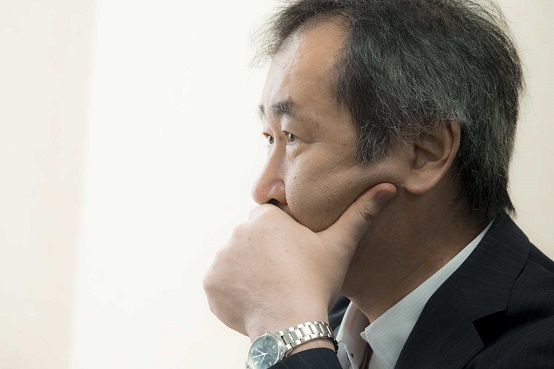
Director of the Institute for Cosmic Ray Research, The University of Tokyo
Shirahase: It seems to me that there are different timescales even within the science fields, for example between engineering and science. What do you think?
Kajita: Yes, and I think that is because the main purpose of the Faculty of Engineering is to meet societal demands.
Shirahase: It may be true that the Faculty of Science is similar to the Faculty of Letters in certain aspects.
Kajita: Yes, you can perhaps say that the sense of time in both Faculties is similar.
Ishii: Mathematics is said to be similar to the humanities in that you can do them both as long as you have some paper and a pen.
Kajita: That reminds me; I heard that the lifestyles of professors in mathematics and literature are similar.
Ishii: In that they don't come to school before noon, perhaps? (laughs)
Shirahase: While thinking about the extensive timescales in the realm of scholarship, let us bring our “short timescale” 90-minute discussion to a close. Thank you very much.
(This interview took place in the Office of the Library President in the Joint Use Building next to the General Library on July 20, 2016.)
Kajita: Yes, and I think that is because the main purpose of the Faculty of Engineering is to meet societal demands.
Shirahase: It may be true that the Faculty of Science is similar to the Faculty of Letters in certain aspects.
Kajita: Yes, you can perhaps say that the sense of time in both Faculties is similar.
Ishii: Mathematics is said to be similar to the humanities in that you can do them both as long as you have some paper and a pen.
Kajita: That reminds me; I heard that the lifestyles of professors in mathematics and literature are similar.
Ishii: In that they don't come to school before noon, perhaps? (laughs)
Shirahase: While thinking about the extensive timescales in the realm of scholarship, let us bring our “short timescale” 90-minute discussion to a close. Thank you very much.
(This interview took place in the Office of the Library President in the Joint Use Building next to the General Library on July 20, 2016.)
~Extras~
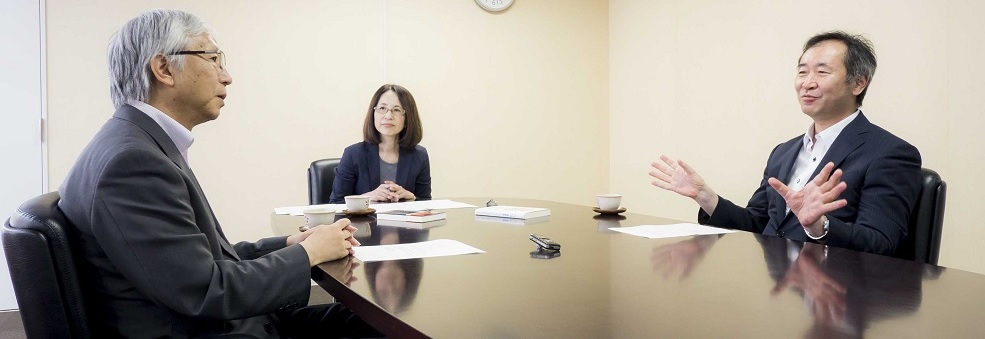
Extra Talk 1
Shirahase: Professor Ishii, did you ever consider going into the sciences instead of the humanities?Ishii: When I learned the method of calculation called tsuru-kame-zan (calculation using the legs of cranes and turtles) in elementary school, I thought it was strange to count the legs of cranes and turtles together because their shapes are totally different. I was unable to put the concrete image of their legs out of my mind. In that moment, I realized that I was not really a science and math person. That does not mean I thought the humanities would be preferable, though. I loathed book report assignments, for instance. I felt indignantly that reading a book in order to write one’s thoughts about it was getting one’s priorities backwards. However, when I was a junior high school student, one of my friends was an avid reader. Due in part to their influence, I decided to go down the humanities route.
Shirahase: Professor Kajita, did you like reading books when you were younger?
Kajita: It is widely believed that I loved reading books, but I actually wasn't really into that. (laughs) Professor Ishii's comment reminded me that I also hated writing book reports. Those assignments were a nightmare. I remember that I groaned while glaring at the blank pages in front of me.
Shirahase: So you two have something surprising in common!
Extra Talk 2
Shirahase: In the sciences, it seems relatively easy to teach and conduct research in English.Kajita: I agree.
Ishii: In the humanities, you cannot do everything in English. English is useful as a communication tool, but if you do everything in English without also doing so in Japanese, the quality of the scholarship you produce will change. It would be unimaginable for non-Japanese researchers to come to Japan and study Japanese literature in English, for instance.
Shirahase: In the sciences, the majority of academic papers are written in English, right?
Kajita: Yes. For that matter, I was told that my English writing tends to use redundant expressions like "postpone until later." This might mean that a person like me who is not good at writing in Japanese is also not good at writing in English. (laughs)
Ishii: Even in the humanities, the use of the English language has become more common in economics. That being said, I think that economics is closer to mathematics than to the humanities.
Extra Talk 3
Shirahase: How did the photo-taking session in the General Library go?Kajita: It had been a long time since I had last entered the General Library, but I have to say that it has a unique atmosphere that exudes pride and dignity. Being there again reaffirmed my belief that this kind of space is necessary for the University.
Ishii: I find being in a space surrounded by books to be absolutely intoxicating! (laughs)
Shirahase: As outlined in the University of Tokyo New Library Plan, the General Library will be transformed into an entirely different form of library. A new building equipped with an automated retrieval system will be constructed underground. While the exterior of the main building will be preserved, the interior will be fully revamped.
Ishii: I think that the face of a university is its library. I am already looking forward to seeing the new face of our University.
Kajita: When the renovation is completed, I hope that the new library will become a place which students spontaneously want to visit.
About the Participants
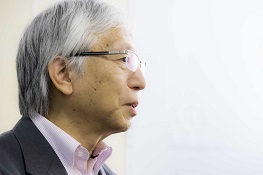
Yojiro Ishii
Born in 1951. After working as a professor and later as the dean of the University of Tokyo's College of Arts and Sciences/Graduate School of Arts and Sciences, Ishii has served as an executive vice president of the University since 2015. He specializes in French literature and philosophy. Books he has written include France-teki Shikou—Yasei no Shikousha-tachi no Keifu (French-style Thinking: History of Wild Philosophers) (2010, Chuko-shinsho Publishing), Kagaku kara Kuusou e (From Science to Imagination) (2009, Fujiwara-shoten Publishing) and Lautréamont: Ekkyou to Souzou (Comte de Lautréamont: Transgression and Creation) (2008, Chikumashobo Publishing). He likes karaoke, traveling and driving.
Born in 1951. After working as a professor and later as the dean of the University of Tokyo's College of Arts and Sciences/Graduate School of Arts and Sciences, Ishii has served as an executive vice president of the University since 2015. He specializes in French literature and philosophy. Books he has written include France-teki Shikou—Yasei no Shikousha-tachi no Keifu (French-style Thinking: History of Wild Philosophers) (2010, Chuko-shinsho Publishing), Kagaku kara Kuusou e (From Science to Imagination) (2009, Fujiwara-shoten Publishing) and Lautréamont: Ekkyou to Souzou (Comte de Lautréamont: Transgression and Creation) (2008, Chikumashobo Publishing). He likes karaoke, traveling and driving.
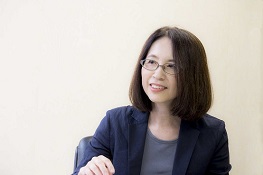
Moderator: Sawako Shirahase
Born in 1958. After working at the National Institute of Population and Social Security Research and the University of Tsukuba, she became a professor at the University of Tokyo's Graduate School of Humanities and Sociology. She has worked as the vice director of the University of Tokyo Public Relations Office since 2016. Her research focuses on population sociology. Books she has written include Ikikata no Fubyoudou (Social Inequality in Lifestyle) (2010, Iwanami-Shinsho Publishing) and Social Inequality in Japan (2014, Routledge). She enjoys appreciating art in her free time.
Born in 1958. After working at the National Institute of Population and Social Security Research and the University of Tsukuba, she became a professor at the University of Tokyo's Graduate School of Humanities and Sociology. She has worked as the vice director of the University of Tokyo Public Relations Office since 2016. Her research focuses on population sociology. Books she has written include Ikikata no Fubyoudou (Social Inequality in Lifestyle) (2010, Iwanami-Shinsho Publishing) and Social Inequality in Japan (2014, Routledge). She enjoys appreciating art in her free time.
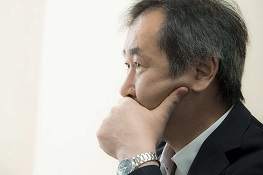
Takaaki Kajita
Born in 1959. After working as a professor at the Institute for Cosmic Ray Research (ICRR), he has been the director of the ICRR since 2008. He specializes in particle physics. Awarded the 2015 Nobel Prize in Physics for his discovery of neutrino oscillations, which shows that neutrinos have mass. Books he has written include Neutrino de Saguru Uchuu to Soryuushi (Exploration of the Universe and Particles with Neutrinos) (2015, Heibon-sha Publishing) and Kamiokande to Neutrino (Kamiokande and Neutrinos) (coauthored in 2016, Maruzen Publishing). He says that he has no hobbies in particular.
Born in 1959. After working as a professor at the Institute for Cosmic Ray Research (ICRR), he has been the director of the ICRR since 2008. He specializes in particle physics. Awarded the 2015 Nobel Prize in Physics for his discovery of neutrino oscillations, which shows that neutrinos have mass. Books he has written include Neutrino de Saguru Uchuu to Soryuushi (Exploration of the Universe and Particles with Neutrinos) (2015, Heibon-sha Publishing) and Kamiokande to Neutrino (Kamiokande and Neutrinos) (coauthored in 2016, Maruzen Publishing). He says that he has no hobbies in particular.
Notes
*1 Professor Ishii thinks that "whether it is science or not" is a more important question than distinguishing the humanities from the sciences. He explains, "Unlike natural and social sciences, the humanities are not considered to be science. As it was believed that philosophy forms a base for all disciplines, the humanities should stand as a base of various disciplines, not one of them."
*2 For example, Professor Shunya Yoshimi (vice president and a professor of the Graduate School of Interdisciplinary Information Studies) explains in his book “Bunkei Gakubu Haishi” no Shougeki (The Impact of "The Abolition of Liberal Arts Colleges") (2016, Shueisha Shinsho Publishing) that the very "knowledge of the humanities," which can offer a new set of values, will be of use when society goes through a major change.
Photos: Junichi Kaizuka
* This interview was originally printed in Tansei 33 (Japanese language only).
*2 For example, Professor Shunya Yoshimi (vice president and a professor of the Graduate School of Interdisciplinary Information Studies) explains in his book “Bunkei Gakubu Haishi” no Shougeki (The Impact of "The Abolition of Liberal Arts Colleges") (2016, Shueisha Shinsho Publishing) that the very "knowledge of the humanities," which can offer a new set of values, will be of use when society goes through a major change.
Photos: Junichi Kaizuka
* This interview was originally printed in Tansei 33 (Japanese language only).






